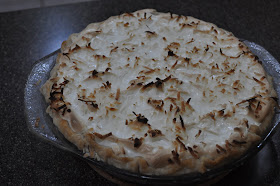*drumroll*
Coconut cream pie!
Meet my Waterloo.
This is the most difficult pie I make. It's time consuming. It's fussy. It requires constant vigilance. It has the potential to be completely disastrous. But if it comes out right, it's oh so good!
Normally I make this for New Year's dinner, but my cousin (the same one who wanted the 12-layer cake for his birthday) is getting his wisdom teeth out on Tuesday and won't be able to eat much of anything on New Year's.
A few "musts" up front. Allot yourself close to an hour to make this pie, all hands on time. Use whole milk. No not leave the filling unattended. Adhere to the bold typed directions if you want to be successful. If you don't have a double boiler, go buy one. They really aren't that expensive, and even though you might only use the top part a couple times a year, the bottom of a double boiler is just a sauce pan that can be used whenever. Trying to rig up a double boiler with two saucepans is tricky, irritating, and can lead to messes, burns, and a pie-fail.
Coconut Cream Pie
Ingredients
- 1/3 cup (6 tablespoons) corn starch
- 2/3 cup sugar
- 1/2 teaspoon salt
- 2 and 1/2 cups whole milk
- 3 eggs, separated
- 1 teaspoon vanilla
- 1 cup flaked coconut
- 6 tablespoons sugar
- 1 baked pie shell
Method:
Start by making your pie shell. You need to make pastry for a single crust pie. After putting it in your pie plate and crimping the edges, liberally prick the bottom and sides of the crust with a fork.
Line the crust with aluminum foil and fill it with dried beans. You can actually buy "pie weights", but dried beans are much cheaper and do the same thing. I store mine in a little canister between uses. If you do not fit the foil to the sides of the crust well, they'll shrink and look ugly. Also, not weighing it down will cause the crust to puff up on the bottom, despite having been pricked with a fork. Just trust me - buy some beans.
Bake the crust on 475 degrees for 8 minutes. Remove the foil and beans, and return to the oven for another 2 minutes. The crust should be golden brown. Set it aside.
In the top of a double boiler, combine the cornstarch, sugar and salt. Slowly stir in the milk. Cook over simmering water, stirring constantly.
When the mixture is thick enough to mound slightly when dropped from a spoon, you're ready to move on to the next step. Cover the double boiler and cook for 10 minutes, stirring occasionally.
While the filling is cooking, separate your eggs. When the ten minutes are up, give the hot mixture a final stir and spoon a little bit of it into the beaten egg yolks. Stir to combine. Do this two or three more times. This is called tempering the eggs. If you do not do this, you will scramble the eggs. I mean it. You'll have little bits of scrambled eggs in your filling. In fact, use a different spoon to stir as you do to transfer filling to the eggs.
Stir the eggs into the remaining hot mix. Cook for 2 minutes, stirring constantly.
Remove the double boiler from the bottom pot. Stir in vanilla and 3/4 cup of the coconut. Let it cool to room temperature. For your reference, what you've basically just make is vanilla pudding with coconut in it.
Beat the egg whites until foamy. Add sugar one tablespoon at a time, beating well between each addition.
Continue beating until stiff peaks form.
Fill the pie shell with the coconut cream. Spread the meringue over the pie, touching the crust all around to seal.
Sprinkle the top with the remaining 1/4 cup coconut.
Bake in a 425 degree oven for 5 minutes, or until the meringue and coconut are toasted.
Cool completely at room temperature and away from drafts. This is essential. If the pie is not 100% completely cool before you put it in the fridge, the filling will liquefy.
I'm not kidding. There have been years in the past when we've poured the filling into cups and drank it.
Be aware that meringue tends to "weep" and can shrink and separate from the edge of the crust. I'm not sure why this happens. It's really not a big deal - it'll taste great anyway. If I figure out the secret to meringue that stays put, I'll let you know.






















No comments:
Post a Comment